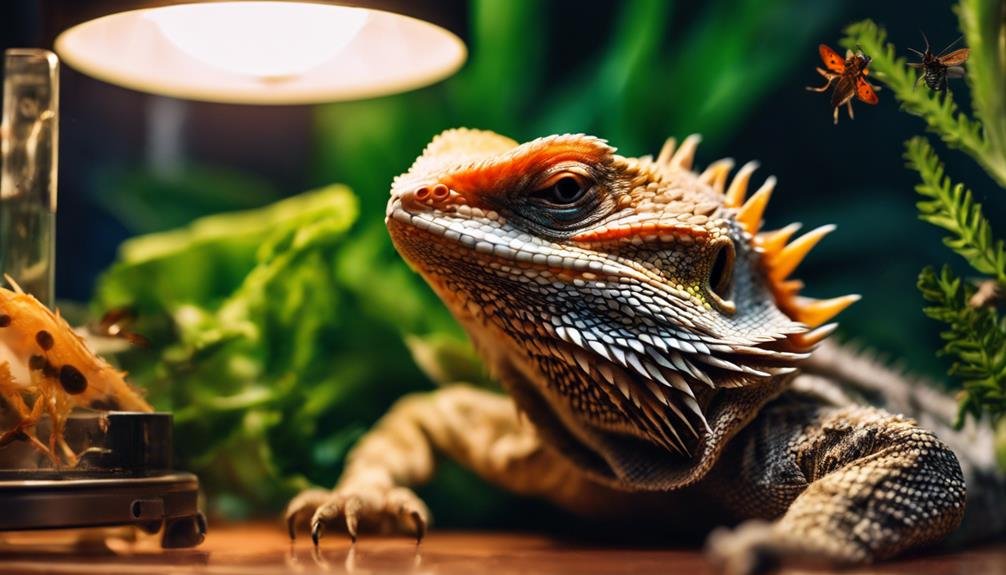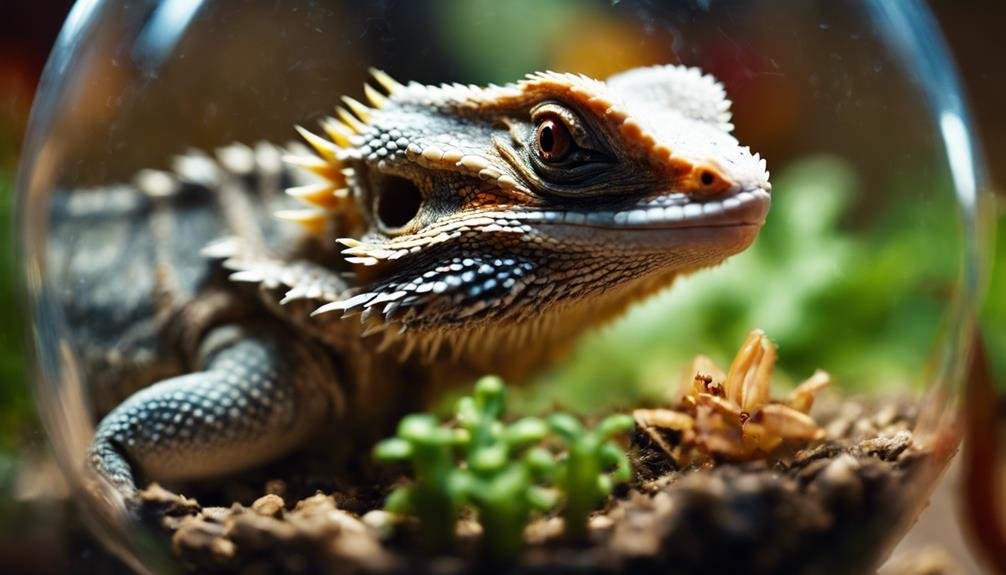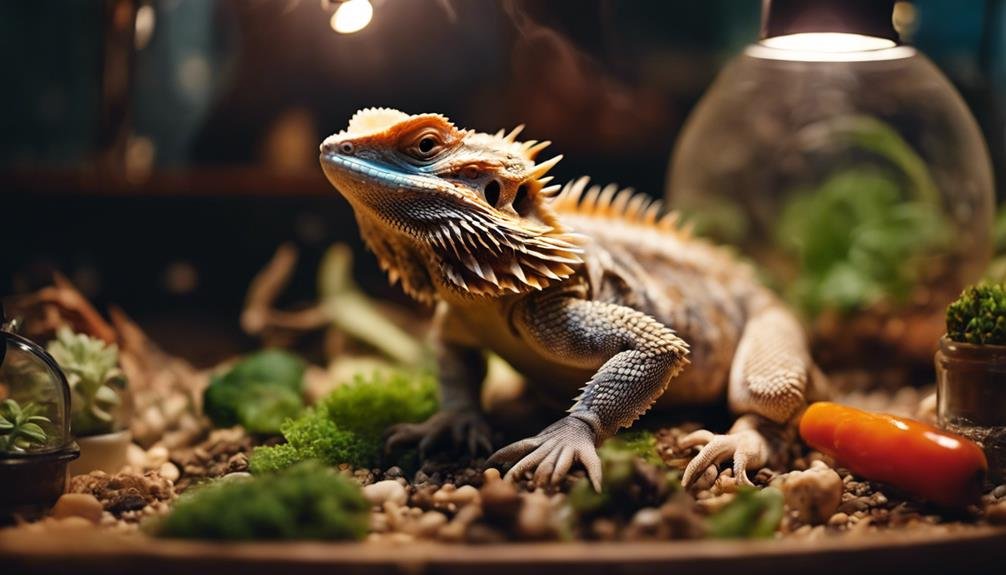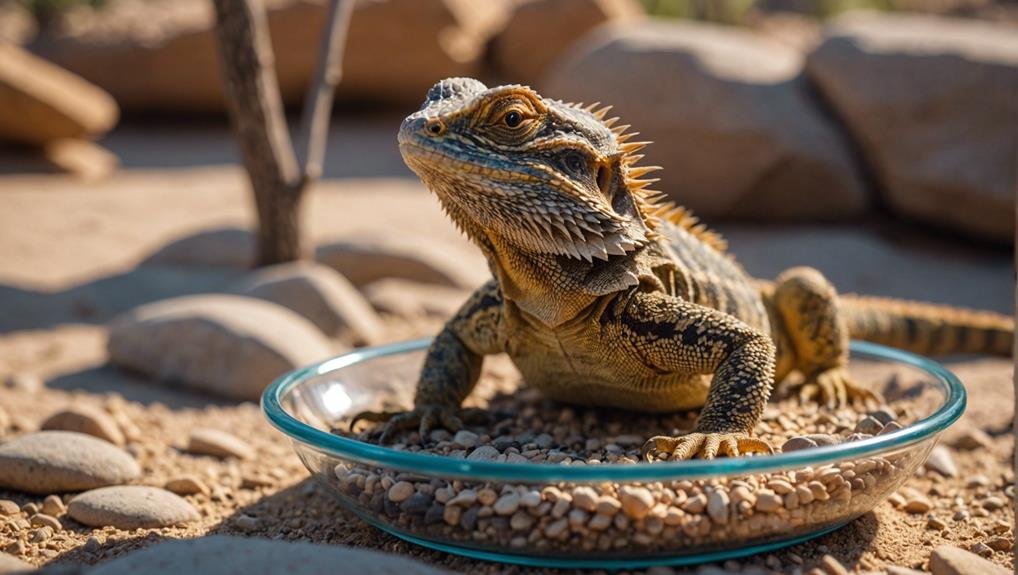You might wonder how long your bearded dragon can safely go without food. Adult bearded dragons, especially during brumation, can survive up to two months by relying on fat reserves stored in their tail and head. However, this doesn’t mean you should ignore any prolonged eating refusal. Monitoring their health and weight is essential during these fasting periods. Juvenile bearded dragons have different needs, and their fasting tolerance is much lower. So, what should you do if your bearded dragon keeps refusing food? Understanding the common reasons for food refusal and knowing when to seek veterinary advice can make all the difference.
Key Takeaways
- Adult bearded dragons can last for up to two months during brumation.
- Juvenile bearded dragons need daily feeding due to high metabolic rates.
- Proper hydration is essential for bearded dragons during fasting periods.
- Health and fat reserves in the tail and head determine fasting endurance.
- Seek veterinary advice if a bearded dragon refuses food for extended periods.
Factors Affecting Fasting Duration


Several factors determine how long a bearded dragon can safely fast. First, the health of your bearded dragon plays a significant role. A healthy bearded dragon can endure longer periods without food than one already struggling with health issues. Juveniles, for instance, need regular protein intake to support their rapid growth and development. Lacking this, their health can quickly deteriorate.
Another important factor is the fasting duration associated with brumation, a hibernation-like state. During brumation, bearded dragons can go weeks without eating, but they should always have access to water. Hydration is essential to prevent dehydration, which can lead to severe health problems. Ensure your bearded dragon has a constant supply of fresh water even when not eating.
Environmental conditions also influence how long your bearded dragon can fast. Proper lighting and temperature are essential for metabolism and overall health. Without these, their ability to endure fasting diminishes.
Adult Bearded Dragon Fasting
Understanding the fasting habits of adult bearded dragons can help you guarantee their health and well-being. Adult bearded dragons can endure extended fasting periods, particularly during brumation.
During these times, it’s crucial to have access to water to maintain hydration.
Brumation is akin to hibernation and can last several months. During this period, your bearded dragon relies on fat reserves stored in its tail and head to maintain energy levels.
While it’s fascinating that they can go this long without eating, you should still monitor their health and weight.
Key points to remember about adult bearded dragon fasting:
- Brumation: They can go weeks without eating but need water.
- Fat Reserves: They rely on stored fat in the tail and head.
- Extended Fasting Periods: These are up to two months but are not recommended for their health.
If your adult bearded dragon isn’t in brumation but is refusing food, it’s important to consult a veterinarian to rule out any health issues.
Keeping an eye on their overall condition will help them remain healthy even during fasting.
Juvenile Bearded Dragon Needs


Unlike adult bearded dragons, juvenile dragons must eat daily to support their rapid growth and development. A balanced diet of live insects and fresh greens is crucial for their proper growth. Juvenile bearded dragons have high metabolic rates and require more frequent feedings to maintain their energy levels and overall well-being.
If your juvenile bearded dragon refuses food for over a few days, it could be a sign of potential health issues. It’s important to monitor their weight and behavior closely. Sudden changes can indicate underlying problems that need to be addressed. Lack of appetite in juvenile dragons can lead to stunted growth and other serious health concerns.
Always seek veterinary advice if your juvenile bearded dragon consistently refuses food. A vet can provide guidance and identify any health issues that may not be immediately apparent.
Ensuring a varied diet of live insects and fresh greens, along with regular check-ups, can help maintain the health and vitality of your young bearded dragon. You can support their healthy development and avoid complications by staying attentive to their dietary needs and behavior.
Monitoring Health During Fasting
When your bearded dragon is fasting, regularly monitoring their weight is crucial to guarantee they stay healthy. Track their weight weekly to notice significant changes, as sudden weight loss can indicate a problem. While dragons can stop eating for various reasons, monitoring fasting periods properly is important.
To effectively monitor health during fasting, you should:
- Check for signs of health: Confirm the base of the tail is thick, and the fat pads on the head are full. These indicators suggest your dragon is still storing enough energy.
- Assess overall health: Look for visible ribs under the skin. Your bearded dragon may not get proper nutrition if you can see them.
- Hydration levels: Test hydration by gently pinching and releasing the skin. If it snaps back quickly, your dragon is well-hydrated. Also, observe their soaking and drinking habits.
Regularly monitoring these factors helps ensure your dragon remains healthy even if they’re not eating. By monitoring these signs, you can intervene early for any concerns. Always consult a vet if you’re unsure about your bearded dragon’s health during fasting.
Common Reasons for Food Refusal


There are several common reasons why your bearded dragon might refuse food. One primary reason is brumation, a hibernation-like state that adult dragons enter, especially during colder months. During brumation, they can go weeks without food but must have access to water to maintain their health. It’s normal for them to eat very little or not at all during this period.
Food refusal can be more concerning for juvenile dragons since they need consistent protein intake for growth. A young bearded dragon without food for extended periods can impact their development and overall health.
Stress is another common factor that can lead to food refusal. Changes in their environment, handling, or even the presence of other pets can stress them out, causing them to lose their appetite.
Additionally, improper tank conditions, such as incorrect temperatures or lighting, can also result in food refusal. Bearded dragons are sensitive to their habitat any imbalance can affect their eating habits. Ensure they have the right conditions and access to water at all times.
Seeking Veterinary Advice
If your bearded dragon continues to refuse food despite addressing common issues, it’s time to seek veterinary advice. Bearded dragon owners should understand that prolonged food refusal can indicate serious underlying health issues. A vet visit is essential to diagnose and treat any potential problems early.
Here are some key reasons to seek immediate vet attention:
- Signs of Illness: Look for symptoms like lethargy, respiratory problems, or changes in stool. These can indicate infections or other health issues that require prompt treatment.
- Impaction: If your dragon shows signs of impaction, such as a bloated abdomen or trouble moving, a vet can provide the necessary treatment to relieve this condition.
- Parasites or Injuries: Reptile vets can check for parasites or injuries that might affect your dragon’s appetite and overall health.
Catching underlying health issues early can lead to effective treatment and recovery. Regular vet check-ups are essential to monitor your dragon’s health and promptly address eating concerns.
Don’t wait too long before consulting a reptile veterinarian; taking quick action can significantly improve your bearded dragon’s well-being.
Conclusion
To sum up, monitoring their health and weight is crucial, while adult bearded dragons can go up to two months without food. Juveniles require more frequent feeding.
Always be vigilant for common reasons they might refuse food, such as brumation or health issues. If your bearded dragon consistently refuses food, don’t hesitate to consult a veterinarian for proper advice and care.
Your pet’s well-being should always be the top priority.


